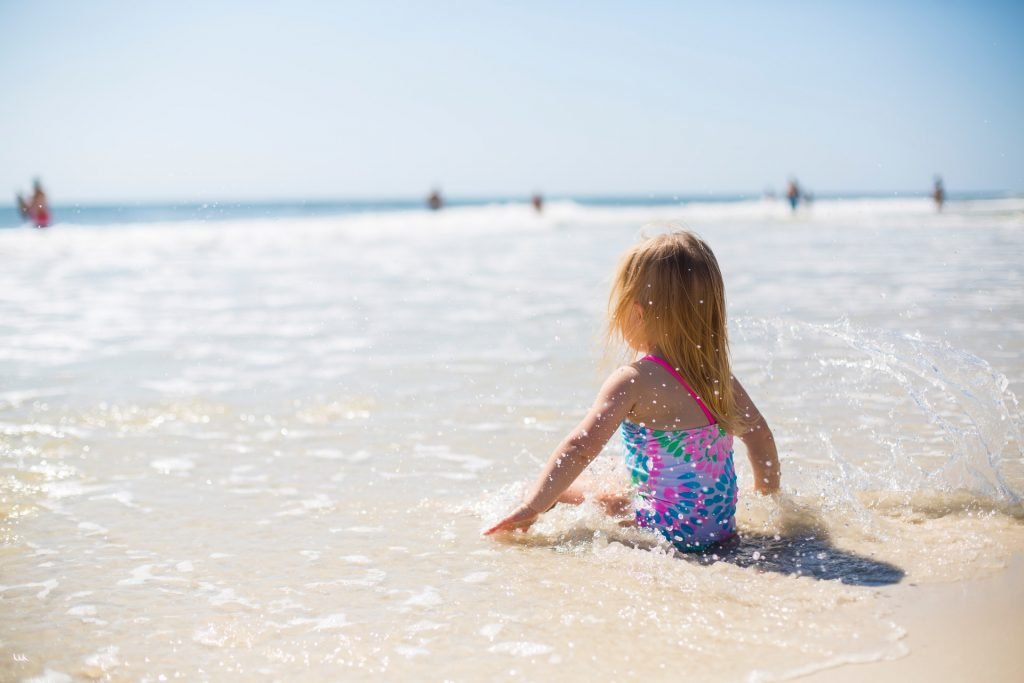
The best sunscreen without chemicals is one that will protect your skin from damaging UVA and UVB rays, without ingredients harmful to your skin and to your health. Skin cancer is a huge problem and has validated the importance of protecting your skin. Clean sunscreen products protect your skin without using toxic ingredients.
AntiAging SkinCare
It is important to take care of you skin all of your life. It can be one of the first ways your age will start to show. But just as important is the health of your skin, your body’s largest organ.
Wrinkles, lines and dark spots are all avoidable.
There are lots of ways to take care of your skin and keep it looking young, including using sunscreen whenever you are outdoors for more than about 15 minutes or so.
Affiliate Disclaimer: This site contains affiliate links, which means we receive compensation, at no extra cost to you, if you make a purchase using the links provided. We appreciate your support so much!
It is equally important to know what’s NOT in your favorite sunscreen as what is.
Think of your skin as a miracle garment. It is soft. It is pliable. It is strong. It is waterproof. It is self-repairing.
Your skin is one of the first things that people see when they look at you. It can help communicate your health, your age, and even your emotional state.
It is the outer layer of your immune system as well, and helps protect your body from threats to your health.
What you really need to be concerned about is that your skin, this miracle garment, is also the way that a dangerous set of chemicals or other ingredients can get absorbed into your body and can make you sick.
Sunscreen is Essential
- With skin cancer a major problem, sunscreen is no longer an option. It is pretty much a necessary part of your life.
- We think it’s important to find a sunscreen that doesn’t have chemicals that may be harmful to your health when they are supposed to be protecting your skin.
It is important to look at two separate issues: 1) protecting your skin against the effects of overexposure to sun that can cause cancer or other harmful effects, and 2) protecting your skin and your body from chemicals that may be in the sunscreen you use – remember sunscreen is used to help you – not add more risks to your health or skin.
If you are out in the sun more than 15 minutes during daytime hours, you need to wear sunscreen.
When I was a teen it was a big thing to get a tan in the summer, the darker the better. I laid in the sun wearing oil that made me tan faster and darker. I did not know that the sun burn and sun tan I was getting was bad for my health. Today we do know more, including the fact that just one bad, blistering sunburn can double your risk for getting skin cancer.
Sun damage affects all layers of your skin. SPF 30 sunscreen can prevent damage to the collagen and elastin layers of your skin that are needed to maintain firmness and prevent sagging and wrinkling prematurely.
Sun damage causes premature wrinkling, sagging, under-eye bags and may weaken the elasticity of your skin. And did you know that sun-damaged skin can bruise easier?
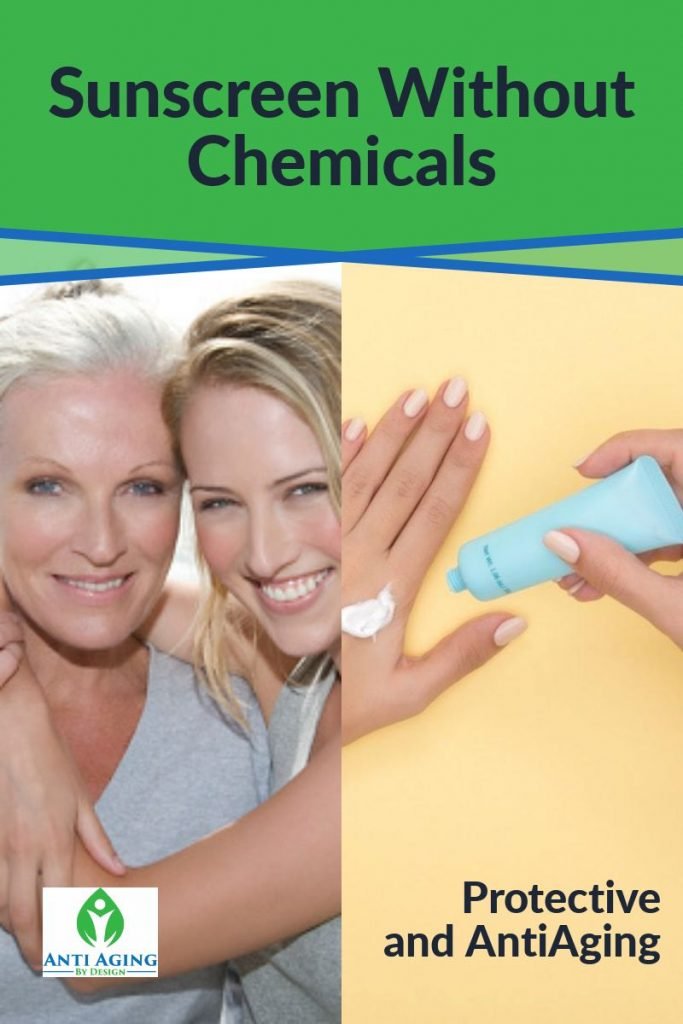
Hidden chemicals in sunscreen may be harmful to your family’s health.
We work on things like eating well, avoiding unhealthy foods and trying to eat more of foods with the nutrients we need to be healthy.
We exercise because we know that keeping active, getting our heart rate up and moving our bones and muscles helps us feel better and even fight the aging process.
But do we think enough about chemicals in the products we use on our skin being a risk to our health?
Why Do Sunscreens Have Harmful Chemicals?
We have the U.S. Food and Drug Administration that does restrict certain known chemicals dangerous to our health.
The U.S. FDA does not cover all of the potentially harmful ingredients that may be found in skin care products. There is a lot of information on this subject and not the purpose of this article to expose all of that, but definitely good to consider in your search for safe products to use.
It is your choice to use safe sunscreen products.
There will probably always be companies that make skin care products like sunscreen with ingredients that may be harmful to your skin. The good news is now there are companies who make “clean” skin care products that do not use ingredients known to be harmful, or even potentially harmful.
We like to choose clean skin care because we have been learning about how to keep our skin healthy. The skin care risks and rates are scary. So many people are affected.
We have also learned that we can use products that work the way they are supposed to work such as protecting your skin from harmful sun rays, and also be healthy to our skin and our body. We don’t have to sacrifice one for the other.
It is your job to find a brand that you trust. When you consider that your skin is your body’s largest organ, it’s important to take good care of it and use products that aren’t going to harm it or age it prematurely.
Science and research have been helpful in discovering what’s harmful and pointing us toward what is more healthy. That doesn’t mean the bad ingredients are going to go away. It means you have a choice to use better.
Why are toxic chemicals a problem?
First let’s acknowledge that chemicals can make effective skin care products. It’s the potentially toxic or harmful chemicals that we want to avoid.
One example is parabens. Why avoid these chemicals that are used as preservatives in sunscreens? There are quite a few reasons that worry us: they can disrupt your hormones, they have been associated with breast cancer, they can cause allergic reactions, and they can interfere with reproductive health.
Note: parabens are used in many skin care products besides sunscreens. Check the ingredients on all of your skin care products.
Harmful or questionable chemicals can be found in any kind of skin care product from lotions to creams to cleansers or toners and more. They are in shampoos and you should really check your shampoo now to make sure it doesn’t have cancer causing chemicals.
Product labels do not show how much of the chemical is in the product, or the adverse effect they might have. Everyday self=care products should be safe, but it is up to you to make sure those you choose really are safe. Children are especially vulnerable because their skin absorbs them more readily than adult skin.
So what kind of chemicals can leave your skin in worse condition, or be contributing to aging your skin? They include chemicals in any of these categories:
- lauryl sulfates
- parabens
- phthalates
- PEG derivatives
- formaldehyde
- preservatives
- synthetic colors or fragrances
All skin care, including sunscreen, is NOT created equal.
There is a shift more recently in choosing home cleaning products that have ‘cleaner’ ingredients, but knowledge about the same issues in personal care products is not as widespread.
In fact, it is still so easy to choose a beauty or skin care brand that you might be familiar with, or was a household name, when you were a child. Today, those common name brands, or really any brand, does not always mean healthy.
You have to do your homework and check ingredients.
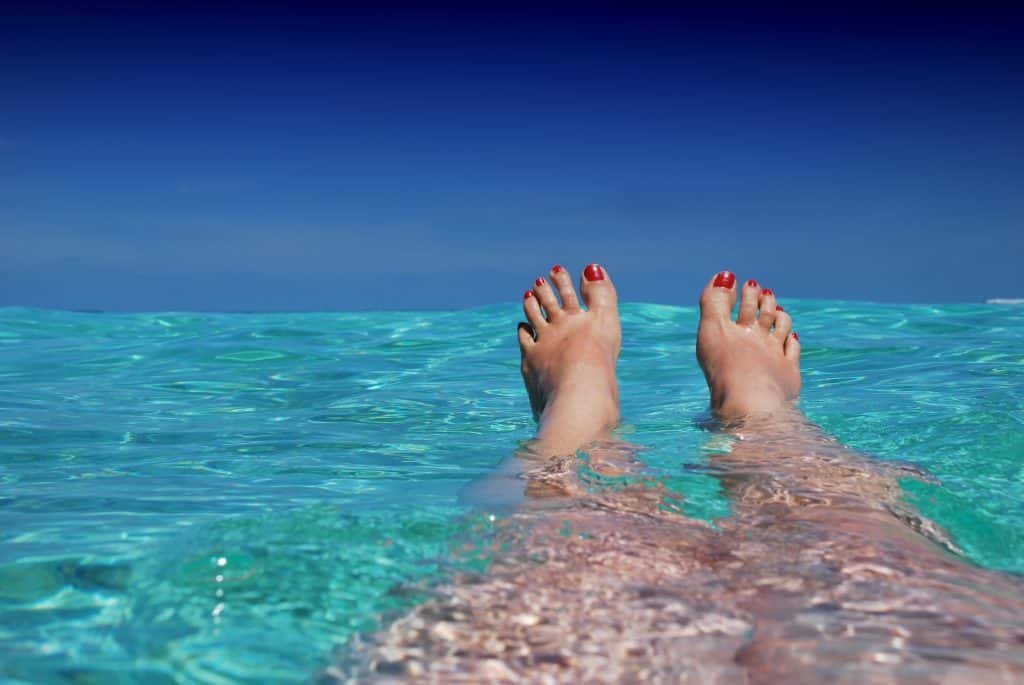
Best Sunscreen Without Harmful Chemicals
We, personally, live as chemical free as we can (without going crazy about it!), and we think the best sunscreen is one without harmful chemicals. We want it to effectively protect our skin, and we don’t want any threat of illness or disease from any of the ingredients that can be harmful to our skin or our bodies.
We don’t want the sunscreen to clog our pores, and we do want it to help prevent dark spots and fine lines associated with aging of our skin.
Sun protection is an important part of skin care in terms of anti-aging benefits as well. That is because the sun is responsible for most of the visible aging of our skin. Using sunscreen can help help with wrinkles, fine lines, age spots, and skin elasticity.
Considering that sun exposure can play a big factor in your skin aging, the good news is that it’s readily manageable with the right protection!
It can look and feel pretty good to ‘get some sun’ but we don’t want the nasty effects of overexposure.
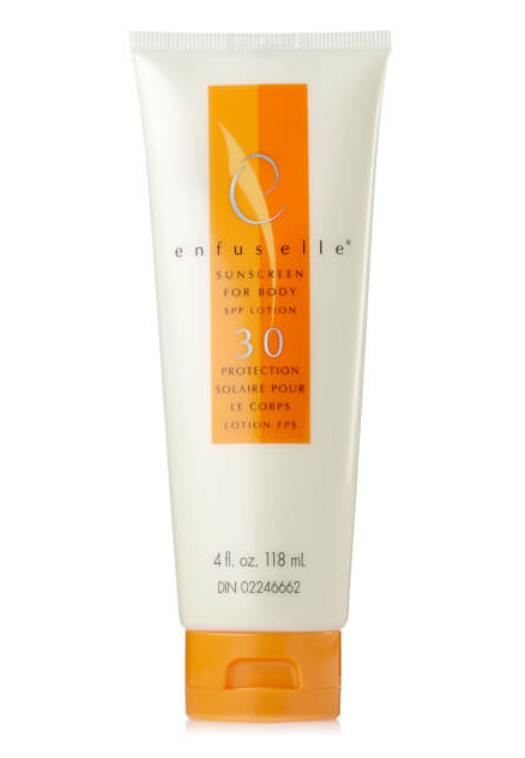
It’s no secret here that we use and recommend the Shaklee brand. They are the #1 natural nutrition company in America, and the brand that helps teach us how to live healthier, including more chemical free.
It makes sense that they would manufacture some of the best skin care and personal care products with nutrients good for your skin. And what is important to us is that Shaklee’s number one concern has ALWAYS been for product safety.
Shaklee always takes product development to the next level, and that’s true for sunscreen also. First, Shaklee sunscreen has SPF 30 that blocks damage from both UV-A and UV-B radiation. Also included in the sunscreen formula is Shaklee patented Vital Repair+ – a remarkable combination of antioxidant vitamins and botanicals, including Vitamins A, D, and E, panthenol, grape seed extract, superoxide dismutast, and beta glucan.
Shaklee sunscreen is formulated for all skin types, even the most sensitive skin. It is water resistant and oil-free; and it smooths easily into your skin, absorbing quickly. There is no sticky residue, and it is made with chamomile extract. It is pH-balanced and hypoallergenic.
Shaklee has the largest ‘FREE OF‘ (chemicals) list of any skin care company, with over 2,500 chemicals and questionable ingredients that they will never use. Here is some additional info about that, including the health risks that have been associated with the chemicals:
- Parabens – endocrine disruptor, breast cancer
- FD&C or D&C dyes – carcinogen, protein inhibitor, hyperactivity in children, immune disruptor
- Butyl Cellosolve – adrenal tumors, birth defects, carcinogen
- Formaldehyde – carcinogen, skin rash, asthma
- Phenols – dermatitis, cytotoxicity, kidney damage
- Propylene glycol – endocrine disruptor, allergies and asthma
Shaklee also never uses the following that can all be found in supermarket and salon shampoos, moisturizers, shaving and cleansing gels, tanning solutions, and even some pharmaceutical products: sodium hydroxide, sodium lauryl or laureth sulfates, naphthalene, ammonia, benzene, kerosene, cresol, petroleum distillates, chlorine, or hydrochloric, sulfuric, sulfamic, or phosphoric acids.
Living more natural, with less chemicals in the products we use in and on our bodies, and in our homes, is all targeted at living healthier and staying well. Chemicals have been associated with lots of illnesses and disease. Living with fewer chemicals getting absorbed into our skin, or breathing them in the air, is living healthier both now and to prevent getting sick later..
Here is where you can learn more about Shaklee sunscreen and purchase it: BUY SHAKLEE SUNSCREEN. Shaklee has also created a 26-page ingredient glossary that describes every ingredient found in their personal and skin care products (and there is a 42-page glossary for nutrition products). It is hard to find any manufacturer that provides that kind of transparency.
Shaklee sunscreen is SPF 30 (Sun Protection Factor 30) and that means it will protect your skin from 97% of the sun’s rays. Higher SPF sunscreens can block slightly more rays but no sunscreen can block 100%. Also good to know is that higher SPF sunscreens last the same amount of time as SPF 30 or any lower number SPF.
You want to make sure that your sunscreen is broad spectrum, which means that it protects you from both the UVA and UVB rays in sunlight.
We have been using Shaklee sunscreen since it was first introduced quite a few years ago (I need to research when it was first introduced). We like it for many reasons and especially because it works to prevent sunburn, sun damage, and it is pleasant to use.
There are no offensive smells and it is gentle for and works for children as well.
A big consideration using Shaklee sunscreen is that it does not have one ingredient that can harm your health.
And maybe important to you is that you don’t have to pay a huge amount of money to get your skin protected safely. Shaklee sunscreen is a fair price and you can afford it for the whole family.
BUY SHAKLEE SUNSCREEN
Questions About Sunscreens Without Chemicals
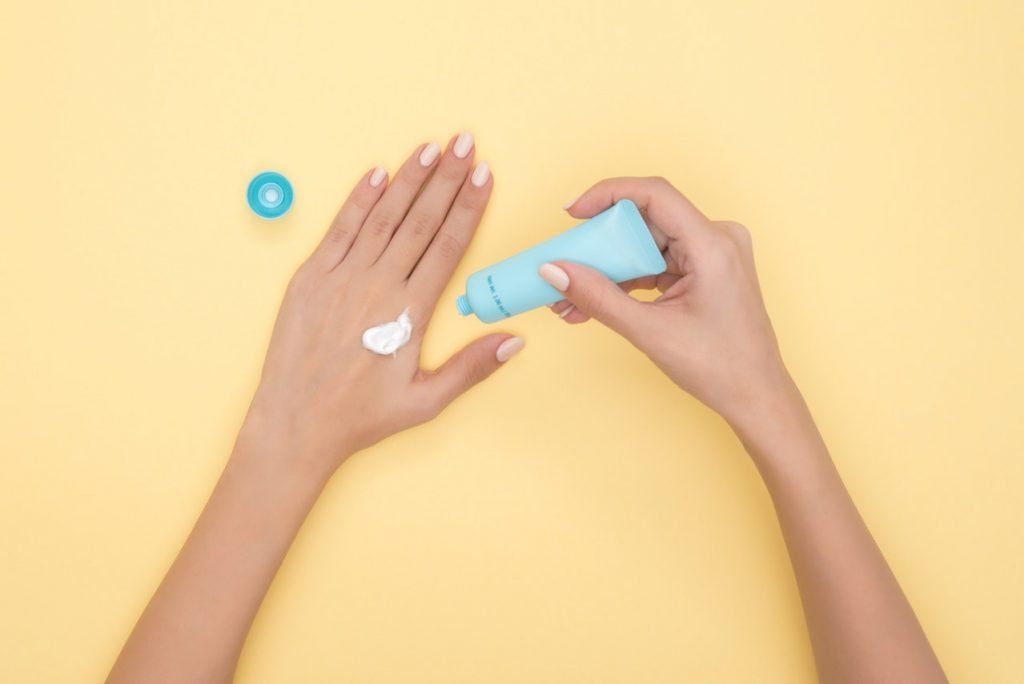
What is the Best Natural Sunscreen?
The best natural sunscreen is one without toxic or harmful chemicals or ingredients. It is made by a brand who tests or screens every ingredient in the product for contaminants.
It is designed for all skin types, including sensitive skin. It does not irritate your skin. It is water resistant and oil-free. It is easily rubbed into your skin and absorbs quickly, without feeling sticky.
The best natural sunscreen is both soothing and moisturizing. It is healthy for your skin, containing antioxidant vitamins and botanicals.
It offers broad spectrum protection from the sun and helps fight premature skin aging.
How Do You Use Sunscreen?
- Put it on all exposed skin areas including the bottom of your feet
- Remember to apply on hard to reach areas like behind your ears, the top of your head and your toes
- Have someone help you with sunscreen on your back
- Reapply every two hours, or after swimming if it’s less than two hours (even if it states water resistant)
- Also reapply after sweating.
- The sun’s ultraviolet rays can damage your skin on cloudy days as well as direct sunshine.
What Brand Sunscreen Without Chemicals Do We Use?
As we stated above, we use The Shaklee brand of natural nutrition and skin care products, including sunscreen. We know (37 years) the brand and love the brand because everything they make is without harmful chemicals. Plus they make sunscreen that is not only protective, but healthy and anti-aging for your skin.
BUY SHAKLEE SUNSCREEN
The nutrients included in Shaklee’s Vital Repair+ inside the sunscreen are antioxidants that can help protect your skin from free radicals that can damage it. Protection from sun burn and reduced risk from skin damage is a Win-Win.
Shaklee makes products as natural as they can, while still being as effective as they have to be to do their job. They do the science, the research, the testing, and the clinical proof that the products work. Every product is backed by a 100% guarantee to work for you.
Take Care of Your Skin in the Sun
The sun is both good for you and bad for you. In small doses there are health benefits like
The sun is bad for your skin (and your body) if you get too much of it without protection. There is the cancer risk and also wrinkles, fine lines and other visible signs of aging are caused by the sun.
When you are outside past that small healthy period, you need to protect it with safe sunscreen because the sun doesn’t turn off – you always need something to help filter its effects.
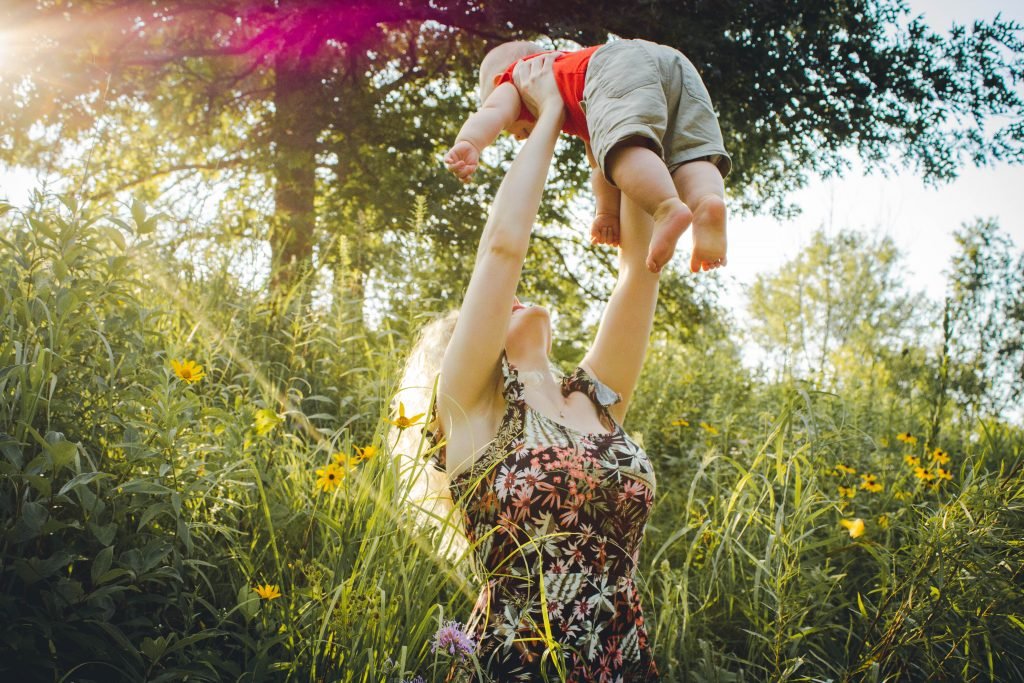
More About Staying Safe in the Sun
Exposure to the sun is good for you in small doses.
Beyond using sunscreen, there are some other things you can target to help protect your skin and keep it healthy.
- Wear clothing that has sun protective fabric.
- Wear a hat with a large brim.
- Sunglasses protect your eyes and help you avoid getting wrinkles around your eyes from squinting.
- Many medications can increase your risk of getting sunburn. Check more about that here: MEDS.
- Drink lots of water while out in the sun – dehydrated skin can lead to losing your skin’s protective barrier.
- Moisturize your skin after sun exposure. Moisturizers with antioxidant nutrients help protect and repair your skin.
- Nourish your skin from the inside by eating healthy foods that include nutrients like Vitamins A, E and C (or supplement).
- Facial moisturizers with SPF protection are great for non beach or pool days when you still need protection.
- Check all of your skin care products to make sure they are clean from chemicals and unsafe ingredients.
Is it important to you to use less chemicals on your skin? Remember that you don’t have to swap out ‘clean’ for performance. Chemical free sunscreens are effective without toxic ingredients.
Safe, chemical free skin care goes well beyond sunscreen. We will be sharing more articles like this about other products such as shampoo and baby/child cleansers.
For now, we will leave you with this to consider. The Environmental Working Group looked at 27,000 personal care products that were assessed based on the ingredients in the products. Just one finding is ALARMING: the carcinogen 1, 4-dioxane is in 55% of baby bubble baths, 47% of baby shampoos, and 55% of baby soaps. This is another reason why Shaklee makes SAFE BABY SKIN CARE products.
The natural nutrition brand we recommend here on the blog are products we have personally used for the past 43+ years. We are not medical professionals. We are on a personal health journey to live younger, energized and healthy longer.
*These statements have not been evaluated by the Food and Drug Administration. These products are not intended to diagnose, treat, cure, or prevent any disease.
